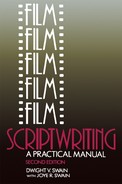Just what should you expect from a book on film scriptwriting? Answer: Tools.
Let me elaborate. Too many years ago, I took a job as scriptwriter for a producer of informational films despite the fact I’d never seen a film script.
What followed was a groping, nerve-gnawing nightmare. Endlessly, it seemed, I ran pictures back and forth through a battered Bell & Howell projector, trying to figure out what made them tick. On the side, I carried lights, dressed sets, played cable boy, and on occasion swept the editing room floor. When I came upon Vladimir Nilsen’s The Cinema as a Graphic Art and V. I. Pudovkin’s Film Technique and Film Acting in the local library, it rated as a major breakthrough. The Calvin Company’s annual production workshop in Kansas City had me shaking with excitement, even while I begged scripts from any and all in order to get some idea of proper format.
This is a process called learning the hard way. I don’t recommend it.
Eventually, I discovered that writing a successful film script is not one thing, but many; for writing is a process made up of an infinity of sub-processes. “Learning to write” means learning how to go through the steps involved in such sub-processes with facility, and how to relate these various sub-processes to each other and to incorporate them into an integrated whole.
Three elements are involved in such learning: work, luck, and talent.
Why do I give work first place? Because it stands as far and away the most important of the trio. As the old line has it, the way to learn to write is by writing. Given enough time, enough patience, enough practice, even the most inept novice will improve. No amount of talk or theory or study can substitute for it.
Though its role is secondary, luck, too, plays a major role in writing. Call it serendipity, if you will: the faculty for stumbling onto the things you need even when you aren’t hunting for them; the blind, unmotivated impulse that leads you to read the right book, talk to the right person, juxtapose the right words or ideas, capture the right insight. And let no one laugh at such a notion who hasn’t awakened in the middle of the night with the perfect solution to a problem, then drifted off to sleep again—only to find when he got up that the thought had vanished.
What about talent?
Well, what about it? Obviously, some of us have greater aptitude than others, whether the area involved be auto mechanics or violin playing or bread-baking.
Or writing.
Why this should be so remains open to question, and really doesn’t matter anyhow. After all, and regardless of who wins the arguments about heredity versus conditioning, you have to start where you are; work with what you’ve got. Certainly it’s nice to have some sort of built-in facility and/or insight at your fingertips. But I can assure you from a fair amount of experience at both writing and teaching that minimal talent plus work will carry you infinitely farther than maximum aptitude lackadaisically applied.
So where does that leave you—you, beginning scriptwriter?
Not too badly off, really. Mostly, what you need is a willingness to acknowledge that you are a beginner: a man or woman essaying a creative task that calls for skills you’ve never mastered.
That being the case, what you need is less theory and generalization than specific, concrete, step-by-step procedures. Whether the approaches and devices you acquire are the ultimate “best” for their purpose is unimportant, for “best” is a tricky concept—that mode of handling that constitutes perfection for one person may prove awkward to the point of uselessness to another. What counts is discovering some way—any way—of coping with your problems effectively. —The simpler, the better. Later on, as you gain experience, you’ll dig out methods optimally suited to your own taste and temperament. Now, what you need is much more basic: down-to-earth tools to help you get your job done.
So. That’s what this book is all about: tools, scriptwriting tools and how to use them. And it matters not at all that some old hand takes umbrage and cries, “But that’s not the way I do it!” or that ten years from now you’ll smile wryly at the idea that these procedures once were your standbys, for by then you’ll know yourself and your craft a full ten years better.
Meanwhile, day by day and step by step, these techniques will help you turn out solid scripts.
Good luck, friends! It’s from the heart.
